

A Visual Summary: 32 Learning Theories Every Teacher Should Know - A Visual Summary: 32 Learning Theories Every Teacher Should Know by Terry Heick Learning theory–and the research that goes into it–is a topic seen frequently in universities and teaching programs, then less frequently after once teachers begin practicing in the classroom.
Why this is true is complicated. (If you’re teaching, you may have more pressing concerns than being able to define obscure learning theories which don’t seem to have a place or role in what you’re teaching tomorrow.) I thought it might be useful to have a brief overview of many of the most important learning theories teachers should know in a single graphic, which is why I was excited to find Richard Millwood‘s excellent graphic.
Millwood is Visiting Research Fellow at Trinity College Dublin, Director of Core Education UK. Some definitions were a bit too brief, so I added language for clarity or depth (though a few I need to go back and further deepen and explain, like ‘Interpersonal Relations.) 1.Instructivism 2. 3. 4. Learning Theories and Models summaries - Educational Psychology. Learning Theories. A Dictionary For 21st Century Teachers: Learning Models. Learning Models, Theories, and Technology: A Dictionary For 21st Century Teachers by Terry Heick and TeachThought Staff Purpose: Improving our chance for a common language in discussing existing and emerging learning trends, model, and technology in hopes of innovation in classrooms, and collectively, education at large.
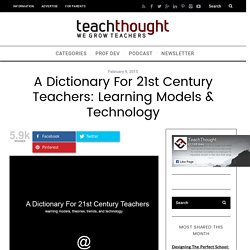
Audience: K-12 & higher ed educators, researchers, institutions, and organizations globally. The Difference Between Instructivism, Constructivism, And Connectivism - The Difference Between Instructivism, Constructivism, And Connectivism by Terry Heick We spend so much time in education trying to make things better.
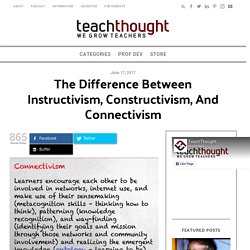
Better policies. Better technology. Better standards. Better curriculum. Better instruction. Learning Theory v5 - What are the established learning theories? In the flow.
Schema Theory. Schema Theory (learning theory, psychology, cognitive science) According to schema theory, people make sense of new experiences and the world by activating the mental representations or schemata stored in their memory.
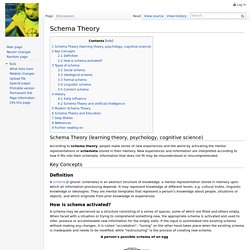
New experiences and information are interpreted according to how it fits into their schemata. Information that does not fit may be misunderstood or miscomprehended. Key Concepts Definition A schema (plural: schemata) is an abstract structure of knowledge, a mental representation stored in memory upon which all information processing depends. How is schema activated? Learning Theories Every Teacher should Know about. Have you ever asked yourself what learning theories you know about and which ones you feel more connected to and apply in your teaching ?
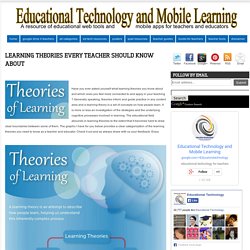
Generally speaking, theories inform and guide practice in any content area and a learning theory is a set of concepts on how people learn. It is more or less an investigation of the strategies and the underlying cognitive processes involved in learning. The educational field abounds in learning theories to the extent that it becomes hard to draw clear boundaries between some of them. The graphic I have for you below provides a clear categorization of the learning theories you need to know as a teacher and educator. Check it out and as always share with us your feedback. Theories of Learning. Learning is one of the most important activities in which humans engage.
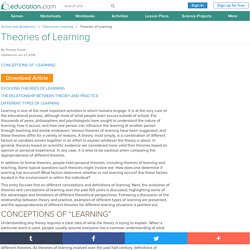
It is at the very core of the educational process, although most of what people learn occurs outside of school. Learning theories. Comparing Theories. Dave's Instructional Design Blog. There are a few definitions of where the line is drawn between a digital immigrant and a digital native.
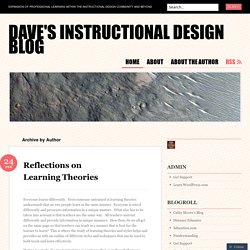
Some consider the transition as 1970, that line where the digital age began (Prensky, 2001). Mostly, however, I consider the technology that could be considered the transition point to digital native would be around 2000. This is when personal computers were commonplace is households and cell phones were gaining favor with the masses. Everything began being connected. By the latter definition, I am a digital immigrant, and a native by the former. Looking at my undergraduate work during early 1990’s and my graduate work in the early 2010’s, there are dramatic differences with the technology that is both available and the ease of its use. Currently, without email or the internet, I could not function in either my job or my schoolwork. Questions used to be asked in person of a peer, coworker, teacher or classmate. Resources Connectivism. (2011, December 14). Prensky, M. (2001). Jenny Arledge's ETEC 561 Blog: Section 2: Theories and Models of Learning and Instruction.
Theories and Models of Instruction I chose to use Gagné’s theory of instruction and the Constructivism theory from Chapter 4 to highlight the differences in the way that instructors can design a lesson to achieve a specific learning goal.
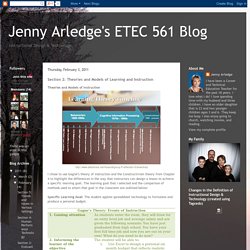
The learning goal that I selected and the comparison of methods used to attain that goal in the classroom are outlined below: Specific Learning Goal: The student applies spreadsheet technology to formulate and produce a personal budget. Gagné’s Nine Events of Instruction In researching Gagné’s nine events of instruction, I found a book by using the Google Books search called The Science of Learning: A Systems Theory Perspective written by Robert Hays (2006).
Social learning theory. Social constructivism and constructivism theories. 21st Century Skills. Cognitivism. Humanism. Situated Learning and Community of Practice. Experiential learning. Rhizomatic learning. Design-based. Behaviorism. Learning Theories & Theorists. Many Learning Theories have been developed over a long period of time, though a majority of those now in use have arisen in the last century or so.
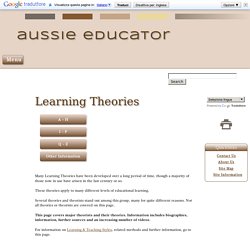
These theories apply to many different levels of educational learning. Several theories and theorists stand out among this group, many for quite different reasons. Not all theories or theorists are covered on this page. This page covers major theorists and their theories. Information includes biographies, information, further sources and an increasing number of videos. For information on Learning & Teaching Styles, related methods and further information, go to this page. Bandura, Albert Bandura and his Social Cognitive Theory. Albert BanduraText presentation on the man and his theories. Bloom’s Taxonomy Benjamin BloomThe man and his works. Constructivism Constructivism and the Five E’sBrief rundown then goes to seven E’s. De Bono, Edward Edward De Bono and lateral & creative thinking. Critical Thinking ResourcesTertiary level.
Dewey, John Anthony F. Timeline. Influential theories of learning. Learning is defined as a process that brings together personal and environmental experiences and influences for acquiring, enriching or modifying one’s knowledge, skills, values, attitudes, behaviour and world views.
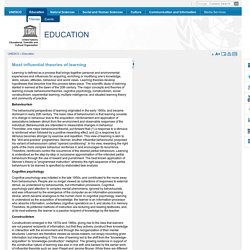
Learning theories develop hypotheses that describe how this process takes place. The scientific study of learning started in earnest at the dawn of the 20th century. 5000 Year Timeline of Learning Theories. R511 Learning Theories Timeline timeline. The Difference Between Instructivism, Constructivism, And Connectivism - Contemporary Theories of Learning: Learning Theorists … In Their Own Words. 1.
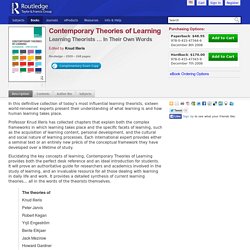
A Comprehensive Understanding of Human Learning, Knud Illeris 2. Learning to be a Person in Society: Learning to be Me, Peter Jarvis 3. What "Form" Transforms? A Constructive-Developmental Approach to Transformative Learning, Robert Kegan 4. Expansive Learning: Toward an Activity-Theoretical Reconceptualization, Yrjö Engeström 5. Learning Theorists. INSTRUCTIONAL DESIGN Learning Theories. Tabu-sam Theories of Learning. Connectivism: A new type of learning for the digital age idea.
Learning theory: models, product and process. Photo by Antenna on Unsplash Contents: introduction · what do people think learning is? · learning as a product · learning as a process · experience · reflective thinking · making connections · committing and acting · task-conscious or acquisition learning, and learning-conscious or formalized learning · the behaviourist orientation to learning · the cognitive orientation to learning · the humanistic orientation to learning · the social/situational orientation to learning · the constructivist/social constructivist orientation to learning · further reading · references · how to cite this article See, also, What is education?
Over the last thirty years or so, ‘learning’ has become one of the most used words in the field of education.